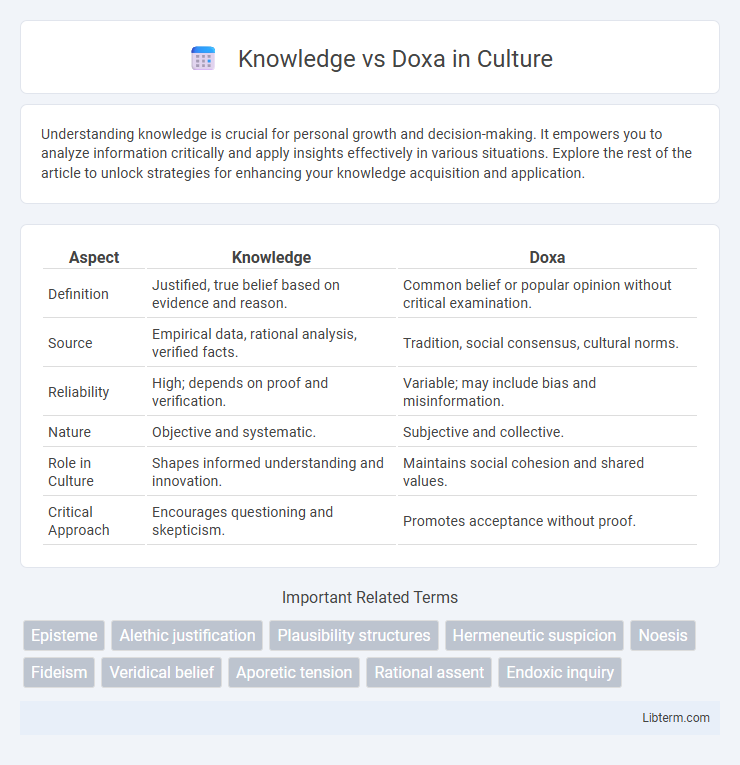Understanding knowledge is crucial for personal growth and decision-making. It empowers you to analyze information critically and apply insights effectively in various situations. Explore the rest of the article to unlock strategies for enhancing your knowledge acquisition and application.
Table of Comparison
| Aspect | Knowledge | Doxa |
|---|---|---|
| Definition | Justified, true belief based on evidence and reason. | Common belief or popular opinion without critical examination. |
| Source | Empirical data, rational analysis, verified facts. | Tradition, social consensus, cultural norms. |
| Reliability | High; depends on proof and verification. | Variable; may include bias and misinformation. |
| Nature | Objective and systematic. | Subjective and collective. |
| Role in Culture | Shapes informed understanding and innovation. | Maintains social cohesion and shared values. |
| Critical Approach | Encourages questioning and skepticism. | Promotes acceptance without proof. |
Introduction to Knowledge and Doxa
Knowledge represents justified true beliefs supported by evidence and reason, forming a reliable understanding of reality. Doxa, contrastingly, refers to common opinion or belief lacking rigorous proof, often shaped by societal conventions or personal perspectives. The distinction between knowledge and doxa is central to epistemology, emphasizing the pursuit of certainty over mere opinion.
Defining Knowledge: Episteme Explained
Episteme represents true knowledge characterized by justified, universal, and unchanging truths, contrasting sharply with doxa, which denotes mere opinion or belief. Rooted in classical philosophy, episteme demands rigorous evidence and rational understanding, forming the foundation of scientific and philosophical inquiry. Unlike doxa's subjective and often unreliable nature, episteme aims for objective certainty and timeless validity.
Understanding Doxa: The Nature of Opinion
Doxa refers to common beliefs or opinions held by individuals without rigorous verification or critical analysis. Unlike knowledge, which is justified and true, doxa represents subjective interpretations often shaped by cultural, social, or personal influences. Understanding doxa involves recognizing its fluid and provisional nature, highlighting the contrast between mere opinion and established knowledge.
Historical Perspectives: Plato and the Knowledge-Doxa Distinction
Plato's epistemology sharply distinguishes knowledge (episteme) from doxa, or mere opinion, emphasizing that true knowledge is justified, immutable, and accessible only through reasoned understanding of the Forms. Historical perspectives highlight that in dialogues such as "The Republic," Plato critiques doxa as unreliable and subject to flux, contrasting it with the stable and objective nature of genuine knowledge. This distinction underpins much of Western philosophical inquiry by establishing knowledge as a higher cognitive state grounded in rational insight rather than sensory perception or popular belief.
Key Differences Between Knowledge and Doxa
Knowledge is justified true belief supported by evidence, whereas doxa refers to opinion or common belief without sufficient justification. Knowledge aims for objective truth through rigorous methods, while doxa relies on subjective perception and social consensus. The key difference lies in knowledge's epistemic validation, contrasting with doxa's epistemic uncertainty and variability.
The Role of Justification in Knowledge and Doxa
Justification serves as the critical foundation that distinguishes knowledge from doxa, as knowledge requires well-supported and evidence-based beliefs, while doxa consists of opinions lacking sufficient justification. Epistemic justification involves coherent reasons, reliable evidence, and truth-conducive methods that validate a belief's accuracy and rational acceptability. Without proper justification, beliefs remain doxic, limiting their epistemic status and preventing their elevation to genuine knowledge.
The Impact of Doxa in Modern Society
Doxa, as commonly accepted beliefs and opinions, heavily influences modern society by shaping cultural norms, media narratives, and political discourse, often reinforcing stereotypes and hindering critical thinking. This widespread acceptance of doxa can limit intellectual growth, promoting conformity instead of fostering knowledge based on evidence and reason. Understanding the impact of doxa is crucial for encouraging skepticism and promoting informed decision-making in education, policy-making, and public communication.
Knowledge, Doxa, and Critical Thinking
Knowledge represents verified, justified beliefs grounded in evidence and reason, while doxa refers to common opinions or unexamined beliefs often accepted without scrutiny. Critical thinking serves as the essential process that differentiates knowledge from doxa by systematically evaluating information, questioning assumptions, and analyzing arguments. Cultivating critical thinking skills enhances the ability to discern reliable knowledge from mere doxa, promoting informed decision-making and intellectual rigor.
Overcoming Doxa: Pathways to True Knowledge
Overcoming doxa requires critical examination of prevailing beliefs by engaging in reflective inquiry and evidence-based reasoning. Pursuing true knowledge involves transcending superficial opinions to embrace verified information through systematic study and empirical validation. Cultivating intellectual humility and openness to revising assumptions fosters a deeper, more accurate understanding beyond common misconceptions.
Conclusion: Embracing Knowledge Beyond Opinion
True knowledge transcends doxa by relying on evidence, critical reasoning, and verifiable truths rather than subjective beliefs or popular opinion. Embracing knowledge encourages intellectual humility and continuous inquiry, fostering a deeper understanding of reality. Prioritizing knowledge over doxa promotes informed decision-making and meaningful progress in personal and collective contexts.
Knowledge Infographic

 libterm.com
libterm.com